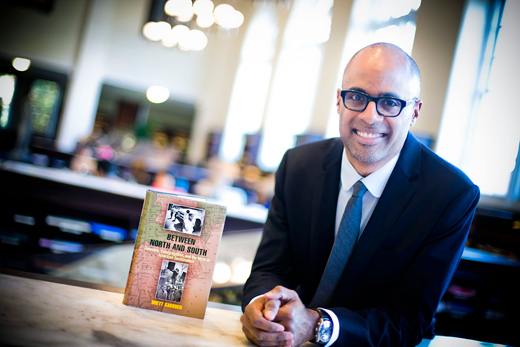Brett Gadsden wants you to spend a little time thinking about that little state of Delaware, where he grew up. The fight for school desegregation in Delaware set the stage for the historic Brown v. Board of Education ruling in the U.S. Supreme Court. The associate professor of African American studies chronicles Delaware’s important role in that era in his book "Between North and South: Delaware, Desegregation, and the Myth of American Sectionalism" (University of Pennsylvania Press, 2012).
Gadsden talks with Emory Report about his latest scholarship:
How would you summarize this book in one sentence?
I hope it’s a thoughtful reflection on what many regard as a central feature of civil rights: school desegregation.
What sparked your interest in this topic?
I grew up in Wilmington, Delaware and I didn’t know much about its history. We didn’t have a lot of Delaware history in my primary and secondary schooling, and so my interest was particularly piqued when I discovered that Delaware was one of the companion cases to Brown v. Board of Education. It was an unexpected opportunity to go home, in a sense -- to do a history of that place where I grew up.
In researching this book, what unexpected discoveries did you make along the way?
There is a certain incongruity between the current popular reflections of the state’s history as a relatively liberal, racially liberal place, and the scope of and depth of white resistance to desegregation. What I discovered in my research was that despite all the positive historical record in Delaware in the school desegregation case, there was a tremendous amount of white opposition to school desegregation that came from conservatives and liberals in the Wilmington metropolitan area and downstate. In Delaware the white opponents weren’t as radical as those who mobilized against Brown v. Board of Education in Virginia or Georgia or Alabama, but there was a great deal of opposition nonetheless.
Will you share an interesting fact from the book?
I argue in my book that Senator [now U.S. Vice President] Joseph Biden is a really important figure in the history of backlash against school desegregation. He emerged as an important figure opposed to busing to address the recurring problems of school segregation. I had not known that.
What kind of impact do you hope this book has?
One of the things I hope my readers take from my book is that there is a tenuous quality to racial reforms. We have to note certain very real advances in American race relations but understand at the same time that they are subject to reoccurring efforts to undermine reforms.
Faculty author spotlights
The Emory Report Book|Report series features interviews with faculty authors. Explore more.

